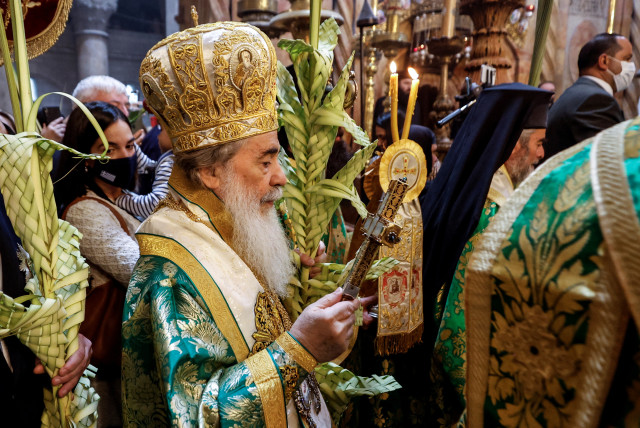Round two of Easter in Jerusalem coming up in a month
Churches abide by different calendars, hence the holidays fall on different days most years.
If you think Easter is over, think again.
In Jerusalem, where a majority of Christians are members of Orthodox denominations, the big celebration of Easter is yet to come.
In fact, when the Orthodox mark Easter on May 5, it will be a full five weeks later than the Easter celebrated in the West this past weekend.
The reason for the discrepancy dates to 1582 when Pope Gregory revised the Julian calendar, established by Julius Caesar in 45 BCE. The eponymously named Gregorian calendar created a two-week gap between the two and caused a split between the denominations: Catholic and Protestant churches followed the new Gregorian calendar while Orthodox churches stuck with the Julian calendar.
Gregory changed the calendar in order to adjust for the drift between the calendar year and the solar year—a few minutes that make a difference over the long term, Yisca Harani, an Israeli scholar on Christianity, told The Media Line.
“A calendar year always has a few minutes that are not counted. Within a few years, Passover or Easter would not be in the spring and that is impossible because it [Passover] is a biblical feast that is called the feast of the springtime,” she said.
Harani explained the yearly requirements for setting a date for Easter. For the Catholic and Protestant churches, the date will always come after the Northern Hemisphere’s spring equinox (approximated as March 21) and then the first Sunday after the full moon. Accordingly, their Easter celebration was on March 31, 2024.
Orthodox celebrate Easter after Passover
But with a gap of 13 days, March 21 on the Julian calendar doesn’t arrive until April 3 on the Gregorian calendar. After that date, Orthodox churches will look for the first Sunday after the full moon to set Easter. However, they have one other requirement—the date must also come after the Jewish Passover.
“What is very important for the Orthodox is to celebrate Easter after Passover because the Jewish Passover is only a prototype, or it’s only the first step toward redemption. It is impossible to celebrate Jesus’ redemption and then go back to the physical earthly redemption of the Jews,” Harani said.
The Orthodox churches are adamant about the date because, for Christians, Jesus symbolizes lambs sacrificed during Passover, which will be celebrated from the night of April 22 to April 29 this year.
The most important holiday in Christianity, Easter celebrates the resurrection of Jesus after his crucifixion at the hands of the ruling Roman authorities at the time. According to the Book of Matthew in the New Testament, Jesus rose from the dead three days after being crucified and buried in Jerusalem around the year 30 CE.
Jesus was in Jerusalem to observe the Passover holiday. In many languages, the word for Easter is derived from the Aramaic Pascha and Hebrew Pesach, meaning Passover.
Despite being such a small part of the population—just 2% of Israelis and 1-2% of Palestinians in the West Bank and Gaza Strip—Christians in the Holy Land represent a wide range of denominations, including Catholic, Lutheran, Anglican, Greek Orthodox, Syrian Orthodox, Armenian Catholic and Orthodox, Maronite, Coptic, and more.
The week preceding Easter is called Holy Week and includes several observances from Jesus’ last week including Palm Sunday, the Last Supper, and Good Friday. All of this is observed by both Western and Eastern Christians, making for an extended holiday period concentrated in Jerusalem.
The festivities will rise to a crescendo on Saturday, May 4, the day before Orthodox Easter, at the Holy Fire ceremony. The annual event, celebrated by Orthodox Christians at the Church of the Holy Sepulcher, draws thousands of pilgrims from around the world.
According to Orthodox tradition, a light emerges from the tomb of Christ symbolizing the resurrection. The Greek Orthodox patriarch and an Armenian priest wait inside the tomb and then pass the flame to the thousands waiting in the church and beyond. The flame is even flown to Orthodox churches aboard, as well.
Though the origin of the ceremony is uncertain, it is believed to have started in the fourth century CE.
Due to the ongoing war in Gaza, this year’s festivities are more subdued, devoid of decorations and scout marching with musical instruments. The patriarchs and heads of churches in Jerusalem said in a statement before the first Easter that despite the “two distant dates of commemoration,” the churches were united in proclaiming “the good news of Christ’s resurrection, first announced by angels nearly two millennia ago at the empty tomb here in the holy city of Jerusalem.”
“In issuing this Easter proclamation, we fully recognize the intense suffering that surrounds us here in the Holy Land, as well as in many other parts of the world,” they said in a statement. “Speaking more directly to our own circumstances, we repeat our denunciation of all violent actions in the present devastating war, especially those directed against innocent civilians, and we reiterate our call for an immediate and sustained cease-fire.”
Jerusalem Post Store
`; document.getElementById("linkPremium").innerHTML = cont; var divWithLink = document.getElementById("premium-link"); if (divWithLink !== null && divWithLink !== 'undefined') { divWithLink.style.border = "solid 1px #cb0f3e"; divWithLink.style.textAlign = "center"; divWithLink.style.marginBottom = "15px"; divWithLink.style.marginTop = "15px"; divWithLink.style.width = "100%"; divWithLink.style.backgroundColor = "#122952"; divWithLink.style.color = "#ffffff"; divWithLink.style.lineHeight = "1.5"; } } (function (v, i) { });

